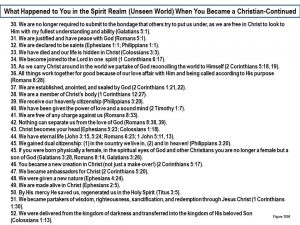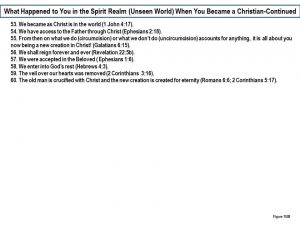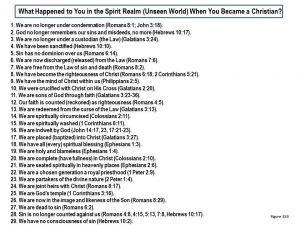In communicating with people via this web site I have become aware of a large number of present day Christians who are reading and studying their Bibles with a major distortion of truth in their minds that hampers a more complete understanding of the word of God! This Learning Activity is specifically written to that cohort of people, who are genuine believers with all of the promises and benefits of eternal life, but are living in bondage to a tradition that prevents them from being completely free in Jesus Christ. My purpose in writing this Learning Activity is to assist them in fully appropriating what Christ has already given to all believers.
“So if the Son makes you free, you will be free indeed” (John 8:36).
By the single act of sacrifice of our Lord Jesus Christ, He, once and forever, provided all that is necessary to set believers free as the above passage indicates. There is no more that God needs to do to provide that freedom, but there is much that can be done to renew the minds of individual believers to that biblical fact and this Learning Activity can be an effective tool for bringing that about.
COME, LET US REASON TOGETHER
It is a biblical truth that God invites us to seriously engage in a reasoning process. The following Bible passages show that to be so.
“Come now, let us –reason– together, Says the Lord…” (Isaiah 17:1, RSV).
“For my thoughts are not your thoughts, neither are your ways my ways, says the Lord, For as the heavens are higher than the earth, so are my ways higher than your ways and my thoughts than your thoughts” (Isaiah 55:8, 9, RSV).
“and according to the custom of Paul, he went in unto them (the synagogues) and for three sabbaths he was –reasoning– with them from the Writings” (Acts 17:2, YLT).
“and he was –reasoning– in the synagogue every sabbath, persuading both Jews and Greeks” (Acts 18:4, YLT).
“and he (Paul) came down to Ephesus, and did leave them there, and he himself having entered into the synagogue did –reason– with the Jews” (Acts 18:19, YLT).
Clearly, God desires for us to use reasoning in our Christianity! I would like to take you through a series of questions about your current belief and what the Scriptures have to say about the subjects we will be looking at.
REMEMBER WHAT FOLLOWS BELOW IS MEANT FOR AN AUDIENCE OF BELIEVING CHRISTIANS SO KEEP THAT IN MIND AS “WE REASON TOGETHER.”
And most importantly, NOTHING that follows below is intended to even imply that New Covenant Christians are encouraged to sin freely! The apostle Paul settled that comment by his statement – HEAVEN FORBID!
REASONING “A”
In Mark 9:1, Jesus is speaking to His disciples (See Mark 8:34) and a “multitude” and said the following: “And he said to them, Truly I say to you, there are some standing here who will not taste death before they see that the kingdom of God has come with power.”
Do you think that some of the disciples or some of the multitude that were present when Jesus spoke those words over 2,000 years ago are still physically alive today? Of course NOT! Do you believe that the kingdom of God is present today? Of course you must, otherwise Jesus told a lie and as Christians we know that is not a possibility! Therefore, when you read a passage that seems to be indicating that the kingdom has not yet come, do you understand that the passage is NOT speaking to today’s New Covenant era of time and must be rightly divided into the Old Covenant or the transition period of time during the first century when both covenants were overlapping? Additionally, do you believe that everything that is described in the Bible as a characteristic of the New Covenant is a present reality? If not, why not?
REASONING “B”
In Mark 13:30, Jesus said to His disciples, (see verse one), Truly, I say to you (disciples), this generation will not pass away (that means die physically) before all these things take place (the “these things” were the things He had just told them in Chapter 13).
Since the items mentioned in Chapter 13 have factually and historically taken place as indicated by the Learning Activities on this web site and other extra biblical historical documents, do you believe what Jesus included in verse 26 of Chapter 13 where He stated that “…they (referring to the same disciples He was speaking to) will see the Son of man (referring to Himself) coming in the clouds (which is apocalyptical language) with power and glory?”
Do you believe that the “Son of man,” Jesus, did come back as He said He would to the disciples, or do you believe that He lied to them?
REASONING “C”
Please read the Scriptures in the following three Charts.

 Left click on each chart to enlarge it for reading
Left click on each chart to enlarge it for reading
I realize that there will be some reading the charts above who will resist believing some of the items listed. Even if you are one of the weakest of Bible students you will have to admit that even though you will convince yourself that some entries are not valid in your opinion, there will still be a significant number of items that are undeniably biblically factual! With that fact in mind, consider the following questions.
Do you understand that ALL New Covenant believers became “new creations in Christ” when they believed?
And that new creation, which is spiritual in nature (takes place in our spirit when Christ comes to indwell us) is understood in the Greek Bible language as something that is totally new and has never existed before? It is a “kainos” new?
When you read and study the Scriptures, do you understand that there is such a thing as “audience relevancy” where the passage may not even apply to you as a New Covenant believer as certain Bible passages were directed to specific people groups such as: Old Covenant believers, New Covenant believers, and even unbelievers, and that you must rightly divide the word of God when reading and applying them to your personal life? Sometimes it is like reading someone else’s mail even though it is profitable to read and study them!
When you read a passage such as those that follow, do you accept them as something you are commanded to do in order to be acceptable to God and have His approval, or do you rightly divide them into the proper time era they belong to in the Scriptural record?
“but as he who called you is holy, be holy yourselves in all your conduct; since it is written, You shall be holy, for I am holy” (1 Peter 1:15, 16). Do you then believe that you must muster up your own personal holiness by your own works program or do you accept that you are already holy because the only one who is holy, Jesus, indwells you the believer? Do not be misled, you are holy but it is not because you act holy it is because Jesus is within you and has declared you holy! Are you able and willing to rightly divide that passage?
“No one that abides in him sins; no one who sins has either seen him or knows him” (1 John 3:6).
Do you apply the above passage to yourself as a believer in the New Covenant?
If you do, you are wrong! All mankind commits sins, and you do not have the power to overcome sin. You never did! It is only because of Jesus that your sin is taken away, not because of any personal efforts on your part. If this is a big surprise to you, wait until your read the next series of passages!!
“For the law brings wrath, but where there is no law there is no transgression” (Romans 4:15). And we know that in the New Covenant there is NO LAW for Jesus nailed it to His Cross of Calvary. By reasoning, we easily should understand that the believer in the New Covenant does not have their sin counted against them. Many think that is too good to be true! But it just happens to be biblically factual!
“…Apart from the law sin lies dead” (Romans 7:8c).
“…How can we who died to sin still live in it? (Romans 6:2).
Do the passages above indicate that Christians do not sin in the New Covenant? Of course not! If you believe that is what these passages say you are focusing on the physical when these passages are applicable to the spiritual realm. It is what has happened in our spirits. We are perfect and sinless because Christ is indwelling our spirit making it alive to God and dead to sin. The physical body is another issue and is controlled by the mind. Here again, the Scriptures make it clear that our minds need renewal and until they are the physical body will commit sins of the flesh.
Consider the following:
God never contradicts or disagrees with Himself.
Since God inspired the Bible, the Bible will not contradict itself.
It then follows that if you find two statements in the Scriptures that appear to contradict each other, the only reason for that can be the following:
1. The translation from the original language into English may be at fault and can be corrected.
2. You are not rightly dividing the passages and each of the passages belongs to different eras of time (covenants) or to different people groups (such as one for believers and one for unbelievers, which I have found is quite common). So the passages are not contradicting each other they are merely being directed to entirely different cohorts of people!
3. You are just plain misunderstanding one or the other passages or even both of them! This, most often, is because proper hermeneutics are not being observed by the reader.
REASONING “D”
“Being asked by the Pharisees when the kingdom of God was coming, he (Jesus) answered them, The kingdom of God is not coming with signs to be observed; nor will they say, Lo, here it is! or There! for behold, the kingdom of God is in the midst of you” (Luke 17:20, 21).
Why, in the passage above would Jesus answer the Pharisees by saying that the kingdom would have no physically visible signs but rather that it was already in the midst of them? What does a rational reasoning person conclude from this passage with reference to the kingdom?
ANSWER: The kingdom of God is invisible to physical eyesight but it is very real in the unseen world. It a nutshell, the kingdom exists in the spiritual realm!
REASONING “E”
Read Luke 21:5-32. This passage has come to be known as the Olivet Discourse and without much controversy describes the Destruction of the city of Jerusalem and its Temple in AD 70 under the attack of the Roman Army and its military leader Titus. In a number of places the word “you” is used. See verses 12, 13, 15, 16, 19, and 20.
Who do you think is being referred to as the “you” in this passage?
Do you think that passage applies to us today?
Do you think it could apply to generations that are future to us today?
The “you” is clearly referring to the disciples and those people who were present at the time these words were spoken (see Luke 20:45). They are the audience to whom these words were specifically directed and this passage directly affected them during the time that they lived because we have today historical documents that describe those events. This principle of bible interpretation is know as “audience relevancy.”
REASONING “F”
Let us look at a topic that is discussed and written on by many in Christian circles about an invisible entity known as Satan. While I write here examine your present understanding on this topic.
“Since therefore the children share in the flesh and blood, he (speaking of Jesus) himself likewise partook of the same nature, that through death he might destroy him (Satan) who has the power of death, that is the devil” (Hebrews 2:14).
What I would like you to see is that the destruction of Satan and his works was part of the mission that Jesus had when He came the first time as Jesus of Nazareth.
On that comment, do you actually believe that Jesus did not complete His mission when He came to earth in that era?
If you are not sure that part of the mission that Jesus had as Jesus of Nazareth was to destroy the Devil, read the following:
“…The reason the Son of God (Jesus) appeared (came to earth as Jesus of Nazareth) was to destroy the works of the devil” (1 John 3:8b).
Are you convinced that Jesus came to acomplish the destruction of Satan’s evil influence in the world? Do you think that Jesus failed that part of His mission?
The apostle Paul in his letter to the Romans states: “…the God of peace will soon crush Satan under your feet” (Romans 16:20).
Do you believe that Jesus did not crush Satan during the lives of some of the Roman believers? If not, why not? The Greek word used here for “crush” is “suntribo” #4937, which has the meaning of “to crush completely, to shatter, break in pieces.” The word soon is Greek #5034, tachei, meaning, quickly, speedily, with haste.” This being the case, do you see any support for Satan still being a factor today some 2000 years later?
CONCLUSION: When the written word of God contradicts my theology, it’s time for me to change my theology!
